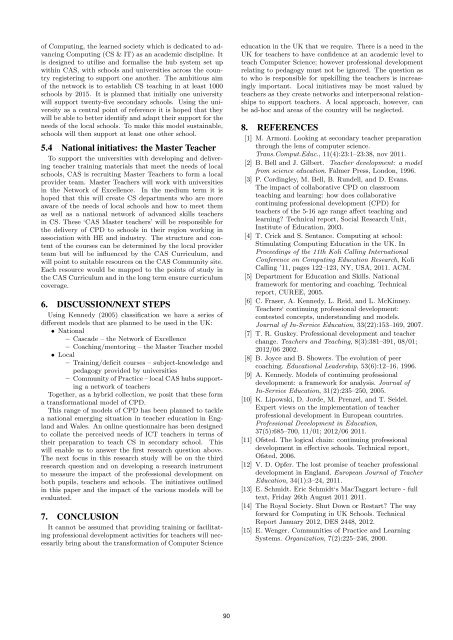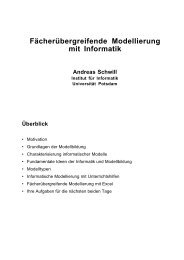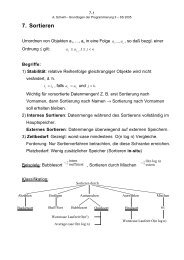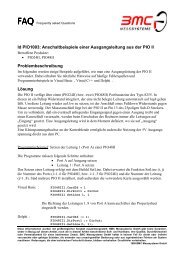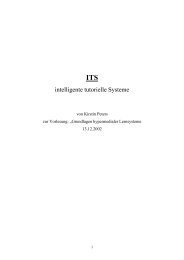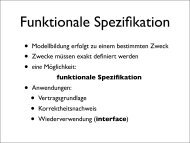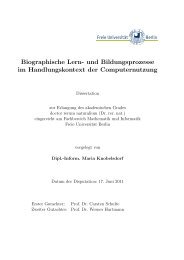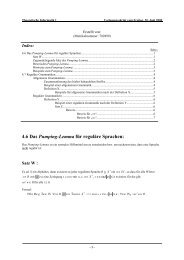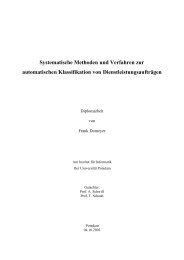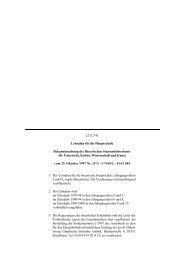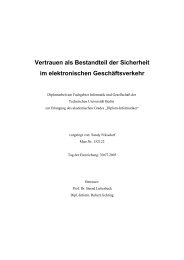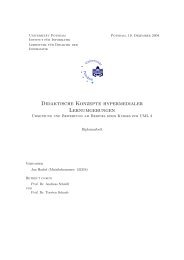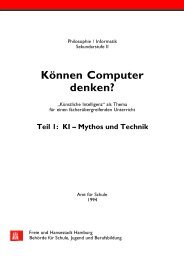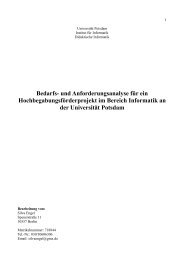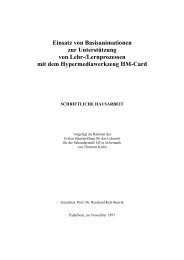Maria Knobelsdorf, University of Dortmund, Germany - Didaktik der ...
Maria Knobelsdorf, University of Dortmund, Germany - Didaktik der ...
Maria Knobelsdorf, University of Dortmund, Germany - Didaktik der ...
Create successful ePaper yourself
Turn your PDF publications into a flip-book with our unique Google optimized e-Paper software.
<strong>of</strong> Computing, the learned society which is dedicated to advancing<br />
Computing (CS & IT) as an academic discipline. It<br />
is designed to utilise and formalise the hub system set up<br />
within CAS, with schools and universities across the country<br />
registering to support one another. The ambitious aim<br />
<strong>of</strong> the network is to establish CS teaching in at least 1000<br />
schools by 2015. It is planned that initially one university<br />
will support twenty-five secondary schools. Using the university<br />
as a central point <strong>of</strong> reference it is hoped that they<br />
will be able to better identify and adapt their support for the<br />
needs <strong>of</strong> the local schools. To make this model sustainable,<br />
schools will then support at least one other school.<br />
5.4 National initiatives: the Master Teacher<br />
To support the universities with developing and delivering<br />
teacher training materials that meet the needs <strong>of</strong> local<br />
schools, CAS is recruiting Master Teachers to form a local<br />
provi<strong>der</strong> team. Master Teachers will work with universities<br />
in the Network <strong>of</strong> Excellence. In the medium term it is<br />
hoped that this will create CS departments who are more<br />
aware <strong>of</strong> the needs <strong>of</strong> local schools and how to meet them<br />
as well as a national network <strong>of</strong> advanced skills teachers<br />
in CS. These ‘CAS Master teachers’ will be responsible for<br />
the delivery <strong>of</strong> CPD to schools in their region working in<br />
association with HE and industry. The structure and content<br />
<strong>of</strong> the courses can be determined by the local provi<strong>der</strong><br />
team but will be influenced by the CAS Curriculum, and<br />
will point to suitable resources on the CAS Community site.<br />
Each resource would be mapped to the points <strong>of</strong> study in<br />
the CAS Curriculum and in the long term ensure curriculum<br />
coverage.<br />
6. DISCUSSION/NEXT STEPS<br />
Using Kennedy (2005) classification we have a series <strong>of</strong><br />
different models that are planned to be used in the UK:<br />
• National<br />
– Cascade – the Network <strong>of</strong> Excellence<br />
– Coaching/mentoring – the Master Teacher model<br />
• Local<br />
– Training/deficit courses – subject-knowledge and<br />
pedagogy provided by universities<br />
– Community <strong>of</strong> Practice – local CAS hubs supporting<br />
a network <strong>of</strong> teachers<br />
Together, as a hybrid collection, we posit that these form<br />
a transformational model <strong>of</strong> CPD.<br />
This range <strong>of</strong> models <strong>of</strong> CPD has been planned to tackle<br />
a national emerging situation in teacher education in England<br />
and Wales. An online questionnaire has been designed<br />
to collate the perceived needs <strong>of</strong> ICT teachers in terms <strong>of</strong><br />
their preparation to teach CS in secondary school. This<br />
will enable us to answer the first research question above.<br />
The next focus in this research study will be on the third<br />
research question and on developing a research instrument<br />
to measure the impact <strong>of</strong> the pr<strong>of</strong>essional development on<br />
both pupils, teachers and schools. The initiatives outlined<br />
in this paper and the impact <strong>of</strong> the various models will be<br />
evaluated.<br />
7. CONCLUSION<br />
It cannot be assumed that providing training or facilitating<br />
pr<strong>of</strong>essional development activities for teachers will necessarily<br />
bring about the transformation <strong>of</strong> Computer Science<br />
90<br />
education in the UK that we require. There is a need in the<br />
UK for teachers to have confidence at an academic level to<br />
teach Computer Science; however pr<strong>of</strong>essional development<br />
relating to pedagogy must not be ignored. The question as<br />
to who is responsible for upskilling the teachers is increasingly<br />
important. Local initiatives may be most valued by<br />
teachers as they create networks and interpersonal relationships<br />
to support teachers. A local approach, however, can<br />
be ad-hoc and areas <strong>of</strong> the country will be neglected.<br />
8. REFERENCES<br />
[1] M. Armoni. Looking at secondary teacher preparation<br />
through the lens <strong>of</strong> computer science.<br />
Trans.Comput.Educ., 11(4):23:1–23:38, nov 2011.<br />
[2] B. Bell and J. Gilbert. Teacher development: a model<br />
from science education. Falmer Press, London, 1996.<br />
[3] P. Cordingley, M. Bell, B. Rundell, and D. Evans.<br />
The impact <strong>of</strong> collaborative CPD on classroom<br />
teaching and learning: how does collaborative<br />
continuing pr<strong>of</strong>essional development (CPD) for<br />
teachers <strong>of</strong> the 5-16 age range affect teaching and<br />
learning? Technical report, Social Research Unit,<br />
Institute <strong>of</strong> Education, 2003.<br />
[4] T. Crick and S. Sentance. Computing at school:<br />
Stimulating Computing Education in the UK. In<br />
Proceedings <strong>of</strong> the 11th Koli Calling International<br />
Conference on Computing Education Research, Koli<br />
Calling ’11, pages 122–123, NY, USA, 2011. ACM.<br />
[5] Department for Education and Skills. National<br />
framework for mentoring and coaching. Technical<br />
report, CUREE, 2005.<br />
[6] C. Fraser, A. Kennedy, L. Reid, and L. McKinney.<br />
Teachers‘ continuing pr<strong>of</strong>essional development:<br />
contested concepts, un<strong>der</strong>standing and models.<br />
Journal <strong>of</strong> In-Service Education, 33(22):153–169, 2007.<br />
[7] T. R. Guskey. Pr<strong>of</strong>essional development and teacher<br />
change. Teachers and Teaching, 8(3):381–391, 08/01;<br />
2012/06 2002.<br />
[8] B. Joyce and B. Showers. The evolution <strong>of</strong> peer<br />
coaching. Educational Lea<strong>der</strong>ship, 53(6):12–16, 1996.<br />
[9] A. Kennedy. Models <strong>of</strong> continuing pr<strong>of</strong>essional<br />
development: a framework for analysis. Journal <strong>of</strong><br />
In-Service Education, 31(2):235–250, 2005.<br />
[10] K. Lipowski, D. Jorde, M. Prenzel, and T. Seidel.<br />
Expert views on the implementation <strong>of</strong> teacher<br />
pr<strong>of</strong>essional development in European countries.<br />
Pr<strong>of</strong>essional Development in Education,<br />
37(5):685–700, 11/01; 2012/06 2011.<br />
[11] Ofsted. The logical chain: continuing pr<strong>of</strong>essional<br />
development in effective schools. Technical report,<br />
Ofsted, 2006.<br />
[12] V. D. Opfer. The lost promise <strong>of</strong> teacher pr<strong>of</strong>essional<br />
development in England. European Journal <strong>of</strong> Teacher<br />
Education, 34(1):3–24, 2011.<br />
[13] E. Schmidt. Eric Schmidt‘s MacTaggart lecture - full<br />
text, Friday 26th August 2011 2011.<br />
[14] The Royal Society. Shut Down or Restart? The way<br />
forward for Computing in UK Schools. Technical<br />
Report January 2012, DES 2448, 2012.<br />
[15] E. Wenger. Communities <strong>of</strong> Practice and Learning<br />
Systems. Organization, 7(2):225–246, 2000.


